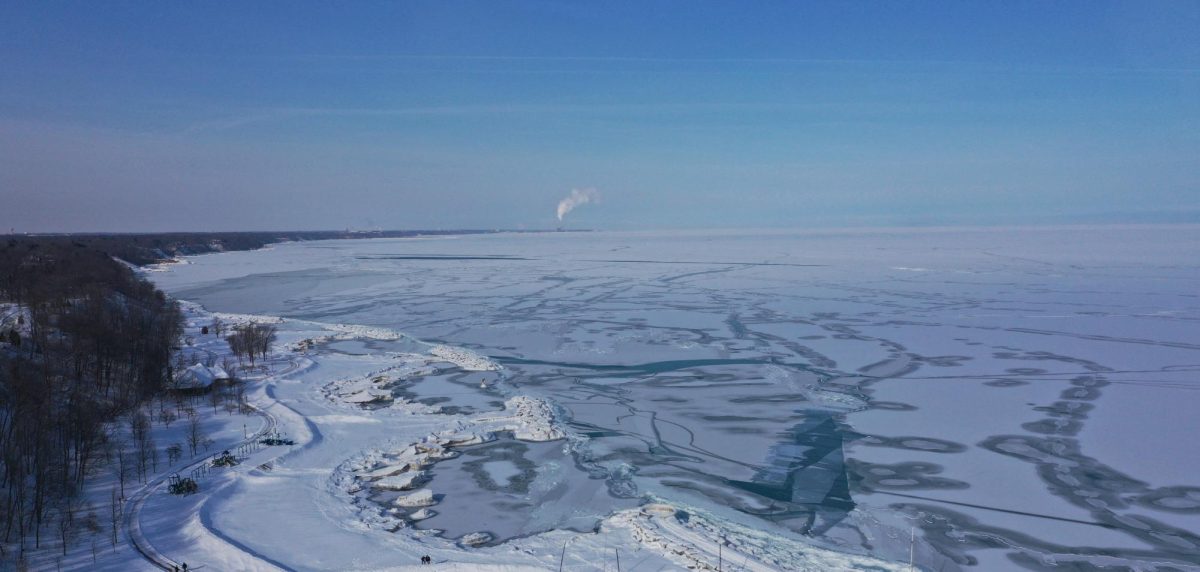Lake Michigan is usually cold and infamously known for experiencing very cold weather throughout the years, however statistical data shows that it is bordering on a warm patch in the coldest part of the year. If we consider the 2017 Great Lakes surface Environmental Analysis data, on November 17th, the surface temperature for Lake Michigan would be about 53.5 degrees Fahrenheit which is very high because during this time the average water temperature is -47.2 degrees Fahrenheit. This makes Lake Michigan the hottest it’s ever been, breaking the record of 53.11 degrees Fahrenheit in 2016.
0.4 degrees Fahrenheit may seem very insignificant to a lot of people, but the results for the lake, surrounding weather systems, and other important factors are to a certain extent. Taking Lake Michigan for example, any little changes in the temperature even just by a few degrees Fahrenheit will change the local and even regional dynamics of the area making it nearly impossible to evaluate the potential problems caused.
Dr. Jennifer Lang, a climatologist expert in the Great Lakes problems, suggests that the steady heating up of Lake Michigan speaks to the climatic shift beyond the lake. She states, “What we’re seeing is a lake that is not cooling as fast as it should,” “Over the past few months, Lake Michigan’s surface water has consistently been above average. This slow cooling is linked to warmer-than-normal air temperatures and a lack of early season cold fronts.”
This pattern of self-suppressing the cooling is getting reversed by the climate warming up, or seasonal things, as it goes with summer temperatures being higher, while winters usually start later than before. Higher lake water temperatures also have an impact on the environmental systems within the lake’s radius and also have an effect on weather systems in the near area and the far hinterlands.
The impact of having an increasing temperature on lakes is mostly immediate, it changes the way that the air moves around and over it. This happens because cold air is coming from Canada and that air is getting warmed up as it moves towards the Midwest. This made winter somehow not so aggressive with snow, it really showed in areas around Western Michigan and places that are by the downwind of the Great Lakes.
Michael Thompson, who is a meteorologist with National Weather Service in Grand Rapids, Michigan said, “The lake is like a giant radiator right now,” “If we get a blast of Arctic air, it could warm by as much as 10 degrees Fahrenheit when going across Lake Michigan. It might mean fewer days with cold temperatures at least at first.”
But there is also another side, cold air encountering warm water will result in very thick snow which results in lake-effect snow. Air as it cools down after passing over the warm waters of a lake picks up the water vapor and it hits the land and snow falls. If conditions such as these are already in places like Grand Rapids, Holland, expect heavy snow. Thompson also said “It’s a double-edged sword,” “Right now, the warmth suppresses snow, but if we get a strong enough cold front later in December, the amount of moisture the lake could provide for snowstorms is outrageous.”
Dr. McIntyre in her intervention highlighted the risk that the prevailing water temperatures could affect the health of Lake Michigan’s ecosystem. It is known that it is not only important to have a balance in the ecosystem but also that the changes in the temperature play a role in all of the deep waters and are used for fishing. It is difficult to predict how the lake’s warmth will affect winter, professionals agree that the effects of the warmth will be felt either way. As we enter the winter season, December and January, going into them will reveal more about the effects of the warm water temperatures and the cold air, especially as colder weather establishes things more because of how cold it is.
In the meantime, people who live around Lake Michigan should keep a lookout on the weather and forecast, specifically the effect that snow will have on the warm water temperatures this year. Whether the winter will be not as cold as usual or it will have snowstorms, one thing that is 100% clear is that Lake Michigan’s warm water record is changing what winter could be like.





